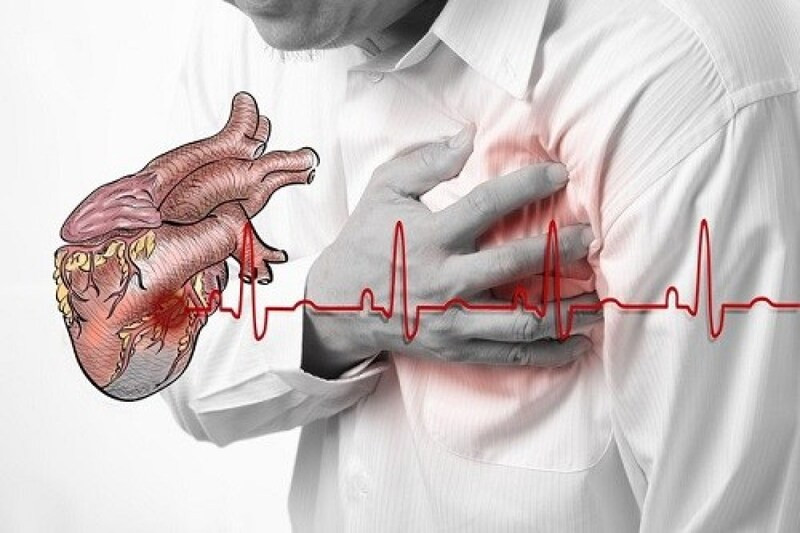In addition to angina, 4 warning signs of acute myocardial infarction that everyone should know
Acute myocardial infarction is one of the leading causes of death in all ages, especially those with coronary artery disease. In addition to angina, the following other signs can also be warning signs of myocardial infarction.
Causes of acute myocardial infarction
Acute myocardial infarction (heart stroke) is a condition in which the heart muscle is deprived of blood supply and dies due to a sudden blockage of the blood vessels supplying the heart muscle by a blood clot in the lumen of the vessel.
If not treated promptly, an acute myocardial infarction can cause permanent heart muscle damage and death.
The cause of acute myocardial infarction is due to atherosclerotic plaque in the coronary artery cracking or rupturing, forming a blood clot that suddenly blocks the artery, stopping the blood supply to the distal myocardium, leading to ischemia of the myocardium.
In fact, if the atherosclerotic plaque does not rupture but continues to grow silently, causing narrowing, it does not cause acute myocardial infarction. If the atherosclerotic plaque ruptures slightly and the blood clot formed afterwards does not completely block the lumen of the vessel, it does not cause acute myocardial infarction but only causes atypical angina.
Other causes that can lead to myocardial infarction are: Secondary coronary artery embolism; Ischemia due to drug use (such as cocaine, amphetamine, ephedrine); Primary coronary artery spasm; Congenital coronary artery anomalies; Coronary artery trauma; Arteritis; Factors that increase oxygen demand (hyperthyroidism, strenuous exercise, fever); Factors that reduce oxygen supply (severe anemia); Aortic dissection; Acute lung disease…

Warning signs of acute myocardial infarction
Myocardial infarction can happen suddenly, but there are cases where it is warned hours, days, weeks in advance by signs such as:
- Typical angina pain appears: Pain like squeezing behind the sternum or slightly to the left, spreading to the left shoulder and the inside of the left arm all the way to the fingers. The pain can spread to the neck, chin, shoulder, back, right arm or epigastric region.
- The patient has symptoms of sweating, difficulty breathing, and wheezing.
- Symptoms of nervousness and palpitations
- Symptoms of vomiting, nausea, confusion
- Some people have digestive disorders. In some cases of acute myocardial infarction, the patient has no or little pain, making it harder to recognize. This case is called silent myocardial infarction, often seen in post-operative patients, the elderly, people with diabetes or high blood pressure.
Not everyone has the same symptoms. Some people have mild pain, some have severe pain, and for others, the first sign is sudden cardiac arrest.

First aid for myocardial infarction
Myocardial infarction can be fatal and most deaths occur before reaching the hospital. Patients who receive early treatment have a better prognosis and recovery after an acute myocardial infarction. Therefore, it is important to get the patient to a medical facility that can perform revascularization treatment as soon as possible after symptoms appear.
The golden time to treat myocardial infarction is 1-2 hours after the onset of symptoms. Or at least within the first 6 hours to reduce the level of heart necrosis and the risk of heart failure later.
Therefore, when detecting a person with acute myocardial infarction, first aid should be given properly as follows: Have the patient sit or lie down, loosen the belt and clothes to help blood circulate easily.
Call 115 or the nearest hospital emergency number. If you cannot wait for an ambulance, take a taxi or take the patient to the hospital yourself.
Chest compressions: Perform as soon as possible because for every 1 minute delay, the patient loses 10% of their chance of survival.
Medical advice
After a heart attack, patients need long-term treatment and care to avoid recurrence and future complications. Therefore, lifestyle changes are necessary throughout the treatment process.
Exercise regularly and lose weight if overweight or obese. Do not smoke, limit alcohol and soft drinks. Avoid salty foods, reduce fatty meats, fast foods and fried foods.
Patients should eat lots of fruits, vegetables, tubers, nuts and seeds. Eat fish or chicken instead of pork or beef.
Avoid stress, practice relaxation. Patients need to take medication and have regular check-ups as prescribed by the doctor.


